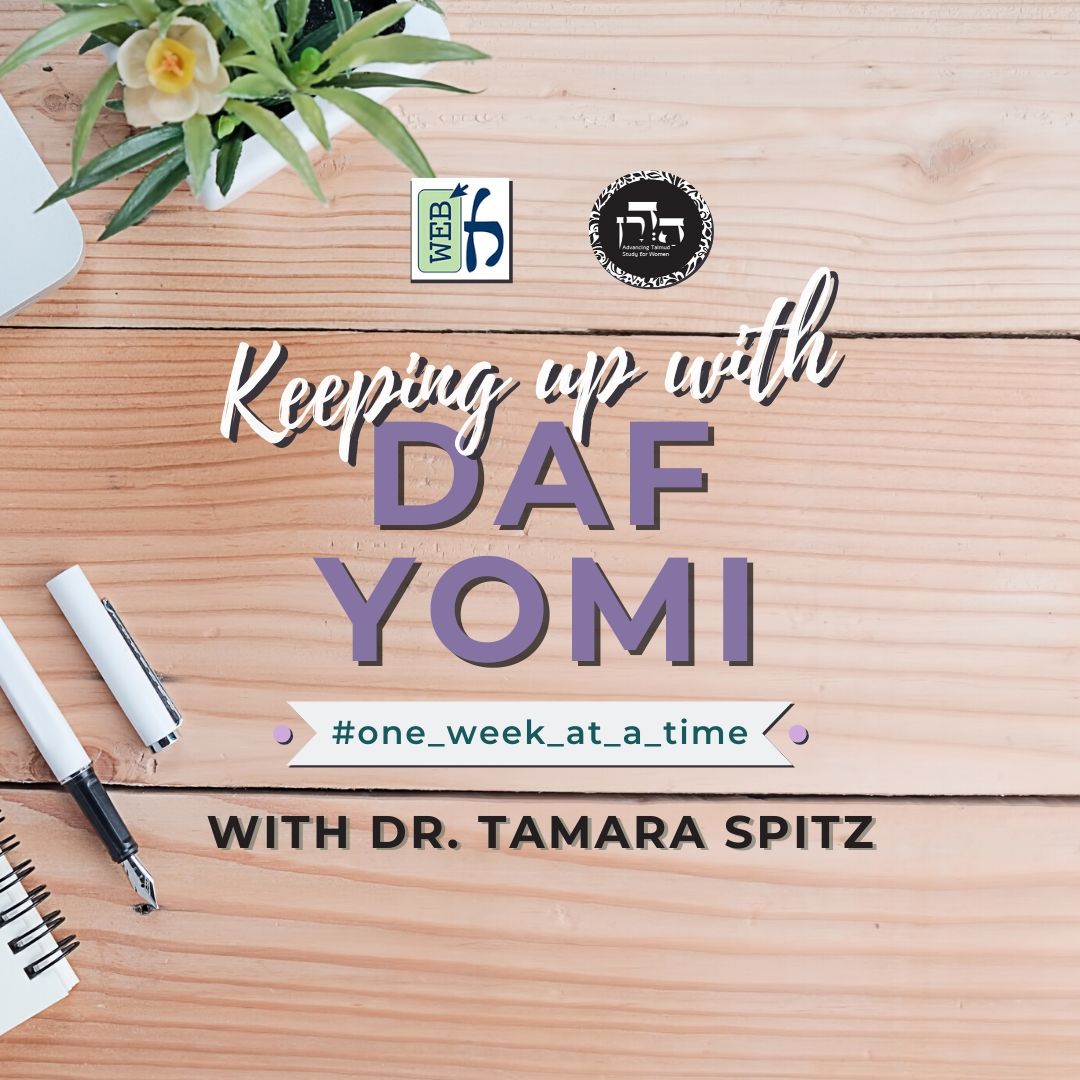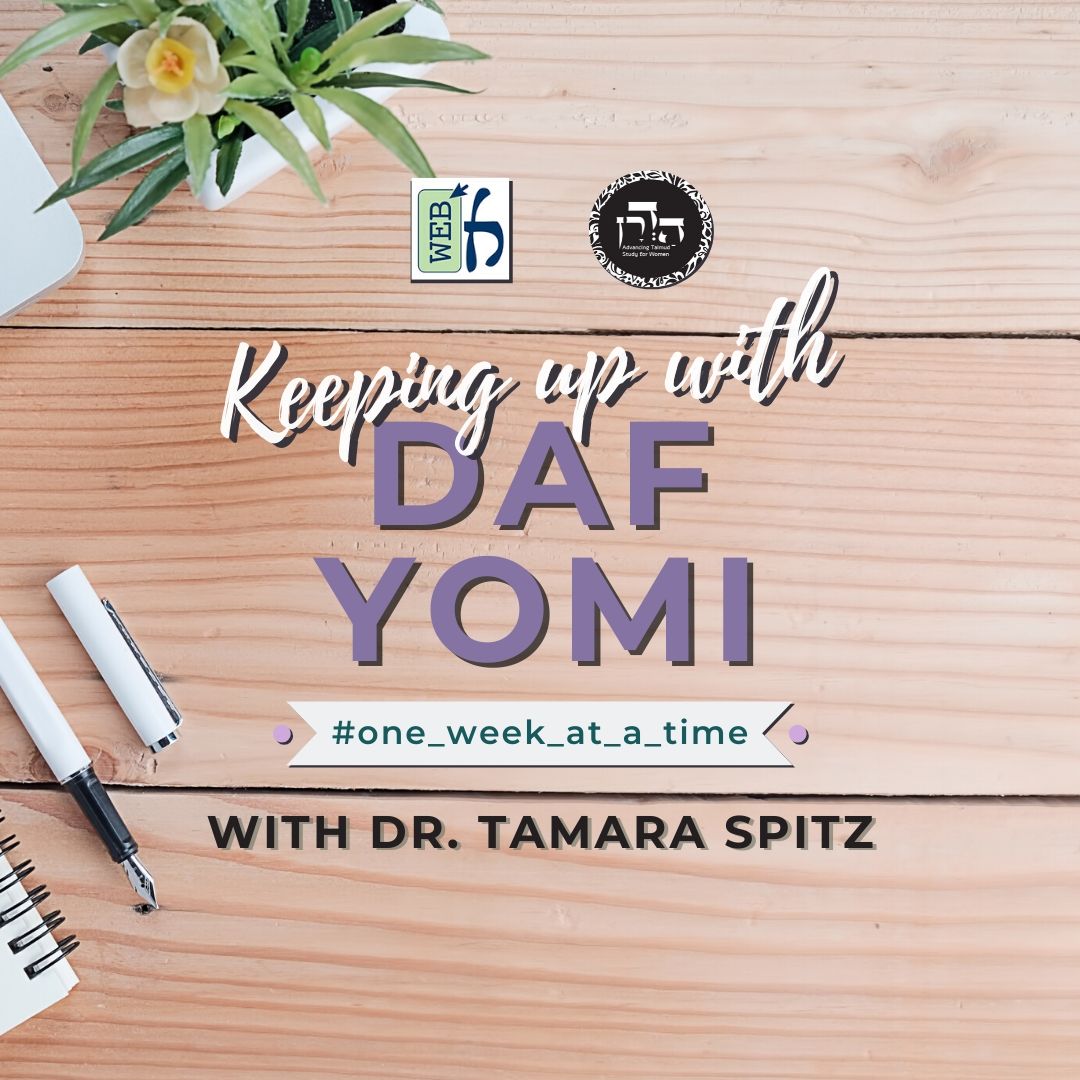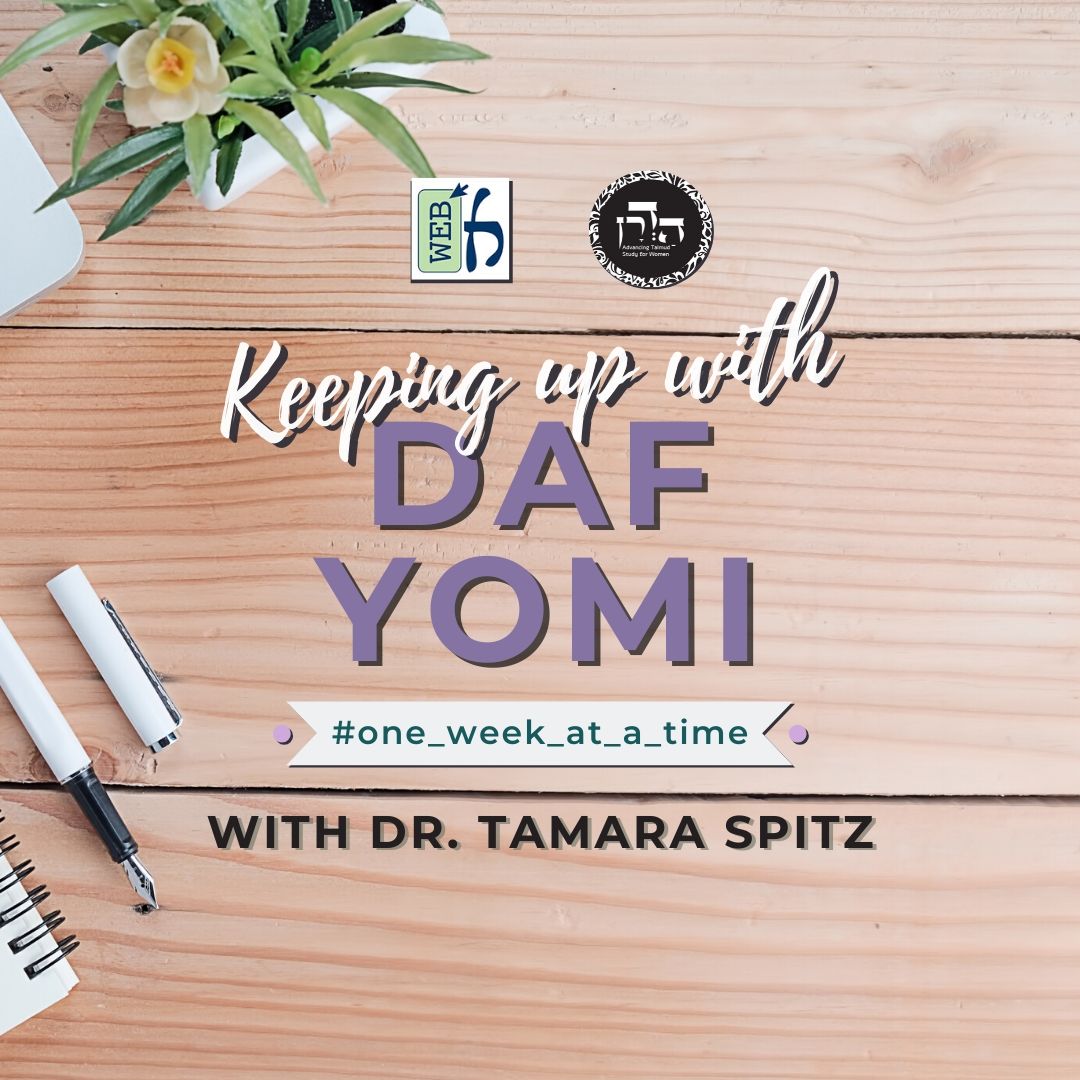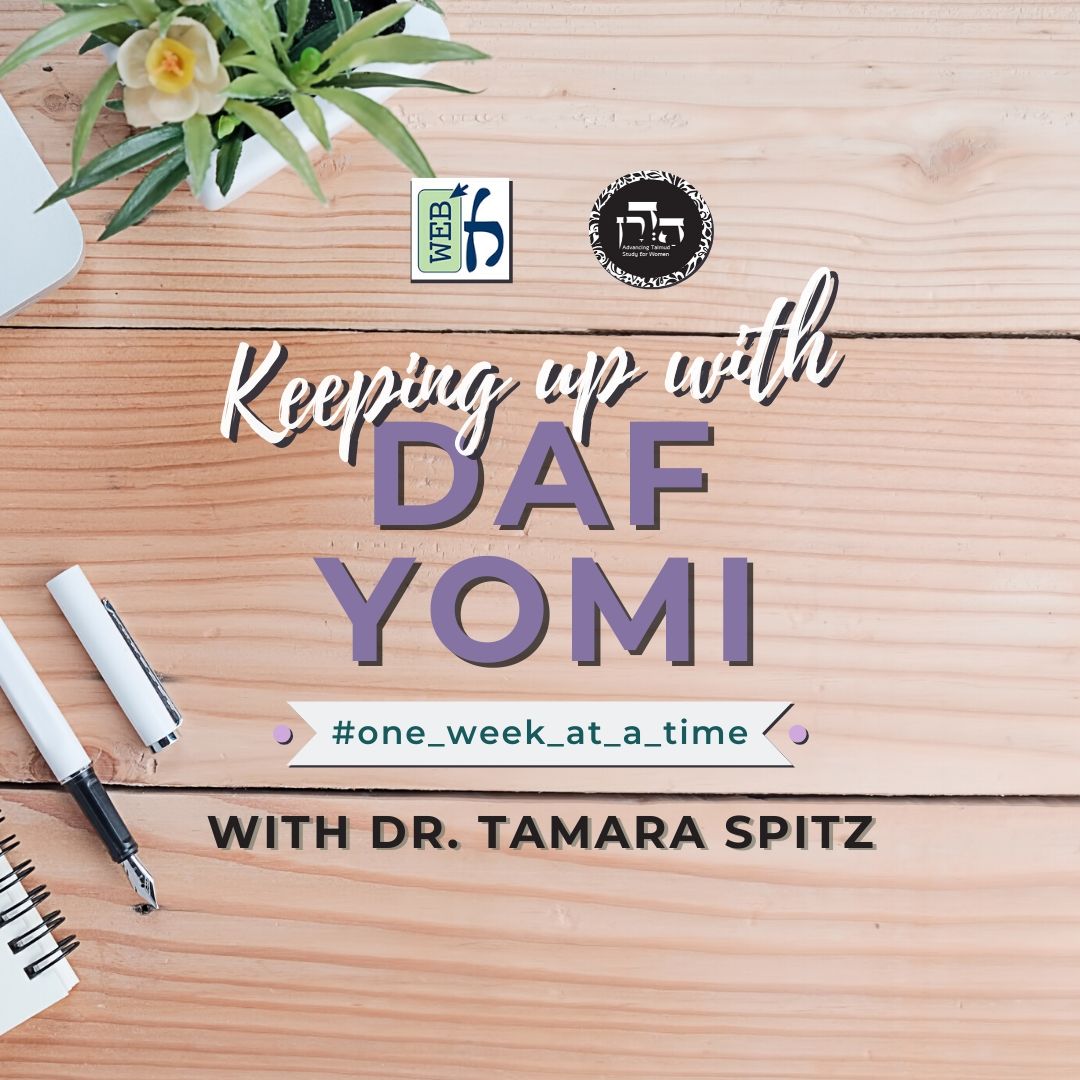What happens if there are doubts regarding two wives of one man – if it is the first for both, the father needs to pay but what if he dies? Does it depend of whether they already divided the property? Does it depend on whether he died within the first 30 days or after? What if two women’s babies get mixed up – if they both have the same husband, different husbands, one has a multiple birth and there are girls born also, one woman already had offspring and one did not, etc.
This week’s learning is sponsored for the merit and safety of Haymanut (Emuna) Kasau, who was 9 years old when she disappeared from her home in Tzfat two years ago, on the 16th of Adar, 5784 (February 25, 2024), and whose whereabouts remain unknown.
This week’s learning is dedicated of the safety of our nation, the soldiers and citizens of Israel, and for the liberation of the Iranian people. May we soon see the realization of “ליהודים היתה אורה ושמחה וששון ויקר”.
This week’s learning is sponsored for the merit and safety of Haymanut (Emuna) Kasau, who was 9 years old when she disappeared from her home in Tzfat two years ago, on the 16th of Adar, 5784 (February 25, 2024), and whose whereabouts remain unknown.
Want to dedicate learning? Get started here:


Today’s daily daf tools:
This week’s learning is sponsored for the merit and safety of Haymanut (Emuna) Kasau, who was 9 years old when she disappeared from her home in Tzfat two years ago, on the 16th of Adar, 5784 (February 25, 2024), and whose whereabouts remain unknown.
This week’s learning is dedicated of the safety of our nation, the soldiers and citizens of Israel, and for the liberation of the Iranian people. May we soon see the realization of “ליהודים היתה אורה ושמחה וששון ויקר”.
This week’s learning is sponsored for the merit and safety of Haymanut (Emuna) Kasau, who was 9 years old when she disappeared from her home in Tzfat two years ago, on the 16th of Adar, 5784 (February 25, 2024), and whose whereabouts remain unknown.
Today’s daily daf tools:
Delve Deeper
Broaden your understanding of the topics on this daf with classes and podcasts from top women Talmud scholars.
New to Talmud?
Check out our resources designed to help you navigate a page of Talmud – and study at the pace, level and style that fits you.
The Hadran Women’s Tapestry
Meet the diverse women learning Gemara at Hadran and hear their stories.
Bekhorot 48
מַתְנִי׳ מִי שֶׁלֹּא בִּכְּרָה אִשְׁתּוֹ וְיָלְדָה שְׁנֵי זְכָרִים — נוֹתֵן חָמֵשׁ סְלָעִים לְכֹהֵן. מֵת אֶחָד מֵהֶן בְּתוֹךְ שְׁלֹשִׁים יוֹם — הָאָב פָּטוּר.
MISHNA: With regard to one whose wife had not previously given birth and then gave birth to two males, i.e., twin males, and it is unknown which is the firstborn, he gives five sela coins to the priest after thirty days have passed. If one of them dies within thirty days of birth, before the obligation to redeem the firstborn takes effect, the father is exempt from the payment due to uncertainty, as perhaps it was the firstborn who died.
מֵת הָאָב וְהַבָּנִים קַיָּימִים, רַבִּי מֵאִיר אוֹמֵר: אִם נָתְנוּ עַד שֶׁלֹּא חָלְקוּ — נָתָנוּ, וְאִם לָאו — פְּטוּרִין. רַבִּי יְהוּדָה אוֹמֵר: נִתְחַיְּיבוּ נְכָסִים. זָכָר וּנְקֵבָה — אֵין כָּאן לַכֹּהֵן כְּלוּם.
In a case where the father died and the sons are alive, Rabbi Meir says: If they gave the five sela coins to the priest before they divided their father’s property between them, they gave it, and it remains in the possession of the priest. But if not, they are exempt from giving the redemption money to the priest. Rabbi Yehuda says: The obligation to redeem the firstborn already took effect on the property of the father; therefore, in either case the sons, his heirs, are required to pay the priest. If the wife gave birth to a male and a female and it is not known which was born first, the priest has nothing here, as it is possible that the female was born first.
גְּמָ׳ דְּמִית הָאָב אֵימַת? אִילֵּימָא דְּמִית לְאַחַר שְׁלֹשִׁים יוֹם — בְּהָא אָמַר רַבִּי מֵאִיר כִּי חָלְקוּ פְּטוּרִין? וְהָא אִשְׁתַּעְבַּדוּ לְהוּ (לנכסי) [נִכְסֵי]!
GEMARA: The mishna teaches that in a case where the father died and the sons are alive, Rabbi Meir says: If they gave the five sela coins to the priest before they divided their father’s property, they gave it; but if not, they are exempt from giving the redemption money. The Gemara asks: When did the father die? If we say that he died after the thirty days following the birth of his sons, does Rabbi Meir say in this case that if they divided their father’s property they are exempt from giving the redemption money to the priest? But the property is already on lien for the mitzva of redemption.
אֶלָּא, דְּמִית בְּתוֹךְ שְׁלֹשִׁים יוֹם, מַאי שְׁנָא כִּי חָלְקוּ — דְּאָזֵיל לְגַבֵּי הַאי וּמְדַחֵי לֵיהּ, דְּאָזֵיל לְגַבֵּי הַאי וּמְדַחֵי לֵיהּ; כִּי לֹא חָלְקוּ נָמֵי — לֵיזִיל לְגַבֵּי הַאי וְלִידַחֲיֵיהּ, וְלֵיזִיל לְגַבֵּי הַאי וְלִידַחֲיֵיהּ!
Rather, it is referring to a case where the father died within thirty days of the birth of his sons, and the obligation of redemption applies to the firstborn himself, whose identity is unknown, but not to the father’s property. If so, what is different about a case where they already divided the property between them, that Rabbi Meir deems them exempt? The reason must be that the priest will go to this son, and the son will reject him by demanding that the priest prove he is the firstborn; and likewise he will go to that other son, and he too will reject him in the same manner. The Gemara challenges this explanation: The same should apply even in a case where they did not divide the property: Let the priest go to this son and he will reject him, and let him go to that son and he too will reject him.
אָמַר רַבִּי יִרְמְיָה: זֹאת אוֹמֶרֶת, שְׁנֵי יוֹסֵף בֶּן שִׁמְעוֹן שֶׁהָיוּ בְּעִיר אַחַת, וְלָקְחוּ שָׂדֶה בְּשׁוּתָּפוּת — בַּעַל חוֹב גּוֹבֶה אוֹתָהּ מֵהֶם, דְּאָמַר לֵיהּ: אִי בְּדִידָךְ מַסֵּיקְנָא — מְנָתָא דִּידָךְ קָא שָׁקֵילְנָא, וְאִי בְּחַבְרָךְ מַסֵּיקְנָא — מְנָתָא דְּחַבְרָךְ קָא שָׁקֵילְנָא.
Rabbi Yirmeya says: That is to say, i.e., it can be inferred from here, that in a case involving two people named Yosef ben Shimon who were residents of one city, and they acquired a field in partnership, a creditor of one of them can collect payment of his debt from either of them, despite the fact that he does not know which of them owes him the money. The reason is that he can say to each of them: If I have a claim against you, I am taking the one hundred dinars that is your share in the joint field, and if I have a claim against the other Yosef ben Shimon, I am taking the one hundred dinars that is his share in the field. This is similar to the case in the mishna, as the brothers who have yet to divide their father’s property are considered partners, and therefore the priest can claim his debt from that property.
אָמַר רָבָא: מִכְּדֵי נִכְסֵי דְּבַר אִינִישׁ אִינּוּן עָרְבִין בֵּיהּ, מִי אִיכָּא מִידֵּי דִּלְדִידֵיהּ לָא מָצֵי תָּבַע לֵיהּ, וּלְעָרֵב מָצֵי תָּבַע לֵיהּ? וְהָתְנַן: הַמַּלְוֶה אֶת חֲבֵירוֹ עַל יְדֵי עָרֵב — לֹא יִפָּרַע מִן הֶעָרֵב, וְקַיְימָא לַן דְּלֹא יִתְבַּע מִן הֶעָרֵב תְּחִלָּה!
Rava said in response: Now consider the principle that a person’s property is a guarantee for him, i.e., it serves as a guarantee for the loan if the debtor does not repay it. Is there any case where one cannot claim repayment from the debtor himself, and yet he can claim from a guarantor? But didn’t we learn in a mishna (Bava Batra 173a): In the case of one who lends money to another with the assurance of a guarantor, he cannot claim payment of the debt from the guarantor? And we maintain in this regard that he cannot claim payment of the debt from the guarantor at the outset, before first claiming the debt from the debtor. How, then, may the priest not claim the redemption money from either brother, and yet he can take it from their property?
אֶלָּא אָמַר רָבָא: לְעוֹלָם שֶׁמֵּת לְאַחַר שְׁלֹשִׁים יוֹם, וְאִי דְּאִיכָּא נִכְסֵי טוּבָא — הָכִי נָמֵי דְּשָׁקֵיל, וְהָכָא בְּמַאי עָסְקִינַן? כְּגוֹן דְּלֵיכָּא אֶלָּא חָמֵשׁ סְלָעִים.
Rather, Rava says: Actually, the mishna is referring to a case where the father died after thirty days following the birth of his sons and the property is already on lien for the mitzva of redemption. And if this is a case where there is a lot of property, so too, the halakha is that the priest takes the five sela coins from that property, even after the sons have divided it, as they are obligated to pay their father’s debt from their inheritance. And what are we dealing with here? With a case where there is only the five sela coins received from their father. That was the entire estate.
וּדְכוּלֵּי עָלְמָא אִית לְהוּ דְּרַב אַסִּי, דְּאָמַר רַב אַסִּי: הָאַחִין שֶׁחָלְקוּ — מֶחֱצָה יוֹרְשִׁין וּמֶחֱצָה לָקוֹחוֹת, וּדְכוּלֵּי עָלְמָא מִלְוֶה הַכְּתוּבָה בַּתּוֹרָה
Rava continues: And everyone accepts the opinion of Rav Asi, as Rav Asi says: In the case of brothers who divided property they received as an inheritance, with regard to half of it they are considered heirs and with regard to the other half they are considered purchasers from each other. And furthermore, everyone agrees that a loan written in the Torah, i.e., a financial obligation by Torah law, such as the redemption of the firstborn,
לָאו כִּכְתוּבָה בִּשְׁטָר דָּמְיָא, וּדְכוּלֵּי עָלְמָא אִית לְהוּ דְּרַב פָּפָּא, דְּאָמַר רַב פָּפָּא: מִלְוָה עַל פֶּה גּוֹבֶה מִן הַיּוֹרְשִׁין וְאֵינוֹ גּוֹבֶה מִן הַלָּקוֹחוֹת.
is not like one written in a document, but like an oral loan. And everyone accepts the opinion of Rav Pappa, as Rav Pappa says: When a creditor gives a loan by oral agreement, he can collect the debt from the heirs of the debtor after his death but he cannot collect the debt from the purchasers of the debtor’s property. Consequently, the priest can collect the redemption money only from the half of the property with regard to which the sons are considered heirs, and since the entire property is worth only five sela coins he would be able to take only two and a half sela coins.
וְהָכָא בְּחָמֵשׁ וְלֹא בַּחֲצִי חָמֵשׁ קָמִיפַּלְגִי, דְּרַבִּי מֵאִיר סָבַר: חָמֵשׁ וְלֹא חֲצִי חָמֵשׁ, וְרַבִּי יְהוּדָה סָבַר: חָמֵשׁ וַאֲפִילּוּ חֲצִי חָמֵשׁ.
And here Rabbi Meir and Rabbi Yehuda disagree with regard to the issue of: Five, but not with half of five. As Rabbi Meir holds that the Torah requires giving specifically five sela coins, but not half or part of five; therefore, the brothers are exempt from giving a priest those two and a half sela coins. And Rabbi Yehuda maintains that the Torah requires giving five sela coins, and even half or part of five. Therefore, he rules that the priest takes those two and a half sela coins from the property with regard to which the sons are considered heirs.
אִי הָכִי, רַבִּי יְהוּדָה אוֹמֵר נִתְחַיְּיבוּ נְכָסִים, נִתְחַיֵּיב גַּבְרָא מִיבְּעֵי לֵיהּ! וְעוֹד, תַּנְיָא: רַבִּי יְהוּדָה אוֹמֵר: הָאַחִין שֶׁחָלְקוּ, אִם יֵשׁ עֲשָׂרָה זוּז לָזֶה וַעֲשָׂרָה זוּז לָזֶה — חַיָּיבִין, וְאִם לָאו — פְּטוּרִין.
The Gemara asks: If so, when Rabbi Yehuda says: The obligation to redeem the firstborn already took effect on the property of the father, he should have said that the obligation to redeem the firstborn took effect on the man, i.e., the brothers who are obligated to pay the sum, as Rabbi Yehuda agrees that the priest forfeits the half of the obligation that applies to the property. And furthermore, it is taught in a baraita that Rabbi Yehuda says: In a case where the identity of the firstborn is unknown, and the brothers divided their father’s property, if there are ten dinars, which equals two and a half sela coins, for this brother, and ten dinars for that brother, they are obligated to pay the priest; and if not, they are exempt.
מַאי עֲשָׂרָה זוּז לָזֶה וַעֲשָׂרָה זוּז לָזֶה? אִילֵּימָא בֵּין דִּירוּשָּׁה בֵּין דְּלָקוֹחוֹת, וְחָמֵשׁ וַאֲפִילּוּ חֲצִי חָמֵשׁ — אִי הָכִי, מַאי אִירְיָא עֲשָׂרָה? אֲפִילּוּ בְּצִיר מֵעֲשָׂרָה נָמֵי!
The Gemara clarifies the difficulty by analyzing the baraita: What is the meaning of the clause: Ten dinars for this brother and ten dinars for that brother? If we say each has ten dinars from the father’s property, which is the total sum of both the half of the inheritance and the half with regard to which they are purchasers together, which equals two and a half sela coins, and Rabbi Yehuda says they are obligated to pay the priest because he maintains that there is a mitzva to give five sela coins and even half or part of five, this is difficult. If so, why specifically state that they are obligated only when there are ten dinars? The same halakha would apply even to fewer than ten dinars, as the priest is entitled to whatever is available.
אֶלָּא פְּשִׁיטָא, עֲשָׂרָה זוּז דִּירוּשָּׁה לָזֶה, וַעֲשָׂרָה זוּז דִּירוּשָּׁה לָזֶה, אַלְמָא: חָמֵשׁ וְלֹא חֲצִי חָמֵשׁ סְבִירָא לֵיהּ!
Rather, it is obvious that in this case there are ten dinars of inheritance for this brother and ten dinars of inheritance for that brother, which totals five sela coins. According to Rabbi Yehuda, it is only in this case that they are obligated to pay the priest. Evidently, Rabbi Yehuda maintains that there is a mitzva to give specifically five sela coins, but not half or part of five, which contradicts the suggested explanation of the dispute.
אֶלָּא, דְּכוּלֵּי עָלְמָא חָמֵשׁ וְלֹא חֲצִי חָמֵשׁ, וְהָכָא בִּדְרַב אַסִּי וְרַב פָּפָּא קָמִיפַּלְגִי.
Rather, the mishna is referring to a case where the father’s property is worth five sela coins, and everyone, both Rabbi Meir and Rabbi Yehuda, agree that the Torah requires giving five sela coins, but not half of five. And here they disagree with regard to the statements of Rav Asi and Rav Pappa that the portion of the inheritance includes only two and a half sela, which the priest is not entitled to collect. Rabbi Meir holds in accordance with their opinion, while Rabbi Yehuda disagrees and holds that all five sela coins are available for the redemption.
וְאִיכָּא דְּמַתְנֵי לֵיהּ אַסֵּיפָא, נִתְחַיְּיבוּ הַנְּכָסִים, דְּמִית הָאָב אֵימַת? אִילֵּימָא דְּמִית לְאַחַר שְׁלֹשִׁים, מִכְּלָל דְּרַבִּי מֵאִיר סָבַר כִּי חָלְקוּ פְּטוּרִין? הָא אִישְׁתַּעְבַּדוּ לְהוּ נִכְסֵי!
§ The Gemara notes: And there are those who teach this discussion with regard to the latter clause of the mishna: If one had two sons and it is unknown which is the firstborn, and the father died, Rabbi Yehuda says the obligation to redeem the firstborn already took effect on the property of the father. Therefore, even if the father’s property has been divided, the sons are required to pay the priest. The Gemara asks: When did the father die? If we say that he died after thirty days following the birth of his sons, should one conclude by inference that Rabbi Meir maintains that if they divided their father’s property they are exempt from giving the redemption payment to the priest? But the property is already on lien for the mitzva of redemption.
אֶלָּא בְּתוֹךְ שְׁלֹשִׁים, כִּי חָלְקוּ, אַמַּאי מְחַיֵּיב רַבִּי יְהוּדָה? לֵיזִיל לְגַבֵּי הַאי לִידַחֲיֵיהּ, וְגַבֵּי הַאי וְלִידְחֲיֵיהּ!
Rather, it is referring to a case where the father died within thirty days of the birth of his sons and the obligation of redemption applies to the firstborn himself, though it is unknown which is the firstborn. If so, why does Rabbi Yehuda obligate them even when the brothers had already divided their father’s property between them? Let the priest go to this son, and he will reject him, by claiming that he is not the firstborn, and let him go to that son and he too will reject him on the same grounds.
אָמַר רַבִּי יִרְמְיָה: זֹאת אוֹמֶרֶת, שְׁנֵי יוֹסֵף בֶּן שִׁמְעוֹן שֶׁהָיוּ בְּעִיר אַחַת, וְלָקַח אֶחָד מֵהֶם שָׂדֶה מֵחֲבֵירוֹ — בַּעַל חוֹב גּוֹבֶה מִמֶּנּוּ, דַּאֲמַר לֵיהּ: אִי בְּדִידָךְ מַסֵּיקְנָא — מְנָתָא דִּידָךְ קָא שָׁקֵילְנָא, וְאִי בְּחַבְרָךְ מַסֵּיקְנָא — מִשְׁתַּעְבְּדָא לִי מִקַּמֵּי דִּידָךְ.
Rabbi Yirmeya says: That is to say: In a case involving two people named Yosef ben Shimon, who were residents of one city, and one of them purchased a field from the other, an earlier creditor can collect payment of his debt from that field. This is because he can say to the buyer: If you are indebted to me I am taking the one hundred dinars that is your share in the field, and if the other Yosef ben Shimon is indebted to me, then this field was on lien to me before you acquired it.
אָמַר רָבָא: מִכְּדֵי נִכְסוֹהִי דְּבַר אִינִישׁ אִינּוּן עָרְבִין בֵּיהּ, וְכוּלַּהּ כְּלִישָּׁנָא קַמָּא.
Rava said: Now consider, a person’s property is a guarantee for him, so why can the creditor not claim his debt from the debtor himself but can claim it from the guarantor, i.e., his property? The Gemara comments: And from here onward, all the rest of the discussion is the same as in the first version of the passage, as cited earlier.
מַתְנִי׳ שְׁתֵּי נָשִׁים שֶׁלֹּא בִּכֵּרוּ וְיָלְדוּ שְׁנֵי זְכָרִים — נוֹתֵן עֲשָׂרָה סְלָעִים לַכֹּהֵן. מֵת אֶחָד מֵהֶן בְּתוֹךְ שְׁלֹשִׁים יוֹם, אִם לְכֹהֵן אֶחָד נָתַן — יַחֲזִיר לוֹ חָמֵשׁ סְלָעִים, וְאִם לִשְׁנֵי כֹּהֲנִים נָתַן — אֵינוֹ יָכוֹל לְהוֹצִיא מִיָּדָם.
MISHNA: With regard to two wives of one man, both of whom had not previously given birth, and they gave birth to two males, i.e., each bore one male, and the sons were intermingled, the father gives ten sela coins to the priest even if it is unknown which son was born first, because it is certain that each is firstborn of his mother. In a case where one of them dies within thirty days of birth, if he gave all ten sela coins to one priest, the priest must return five sela to him, because the father was not obligated to redeem the son who then died. And if he gave the redemption payment to two different priests, he cannot reclaim the money from the possession of either priest, as each could claim that the money that he received was for the living child.
זָכָר וּנְקֵבָה, אוֹ שְׁנֵי זְכָרִים וּנְקֵבָה — נוֹתֵן חָמֵשׁ סְלָעִים לַכֹּהֵן; שְׁתֵּי נְקֵבוֹת וְזָכָר, אוֹ שְׁנֵי זְכָרִים וּשְׁתֵּי נְקֵבוֹת — אֵין כָּאן לַכֹּהֵן כְּלוּם.
If one mother gave birth to a male and one gave birth to a female, or if between them they gave birth to two males and one female, and the children were intermingled, the father gives five sela coins to the priest: In the first case because the male might have preceded the female and in the second case because one of the males is certainly firstborn. If the children were two females and a male, or two males and two females, the priest has nothing here, as it is possible the female was born first to each mother.
אַחַת בִּכֵּרָה וְאַחַת שֶׁלֹּא בִּכֵּרָה, וְיָלְדוּ שְׁנֵי זְכָרִים — נוֹתֵן חָמֵשׁ סְלָעִים לַכֹּהֵן, מֵת אֶחָד מֵהֶן בְּתוֹךְ שְׁלֹשִׁים יוֹם — הָאָב פָּטוּר.
If one of his wives had previously given birth and one had not previously given birth and they gave birth to two males who became intermingled, the father gives five sela coins to the priest, as it is certain that one of them was born to the mother who had not yet given birth. If one of them dies within thirty days of birth the father is exempt from that payment, as it is possible that the one who died was born to the mother who had not yet given birth.
מֵת הָאָב וְהַבָּנִים קַיָּימִים, רַבִּי מֵאִיר אוֹמֵר: אִם נָתְנוּ עַד שֶׁלֹּא חָלְקוּ נָתְנוּ, וְאִם לָאו פְּטוּרִין. רַבִּי יְהוּדָה אוֹמֵר: נִתְחַיְּיבוּ נְכָסִים, זָכָר וּנְקֵבָה אֵין לַכֹּהֵן כְּלוּם.
In a case of intermingling where the father died and the sons are alive, Rabbi Meir says: If they gave the five sela coins to the priest before they divided their father’s property between them, they gave it, and it remains in the possession of the priest. But if not, they are exempt from giving the redemption payment to the priest. Rabbi Yehuda says: The obligation to redeem the firstborn already took effect on the property of the father. If the wives gave birth to a male and a female the priest has nothing here, as perhaps the female was born to the mother who had not yet given birth.
שְׁתֵּי נָשִׁים שֶׁל שְׁנֵי אֲנָשִׁים שֶׁלֹּא בִּכֵּרוּ, וְיָלְדוּ שְׁנֵי זְכָרִים — זֶה נוֹתֵן חָמֵשׁ סְלָעִים לַכֹּהֵן וְזֶה נוֹתֵן חָמֵשׁ סְלָעִים. מֵת אֶחָד מֵהֶם בְּתוֹךְ שְׁלֹשִׁים — אִם לַכֹּהֵן אֶחָד נָתָנוּ, יַחֲזִיר לָהֶם חָמֵשׁ סְלָעִים. אִם לִשְׁנֵי כֹּהֲנִים נָתָנוּ — אֵינָן יְכוֹלִין לְהוֹצִיא מִיָּדָם.
With regard to two women who had not previously given birth, who were married to two different men, and they gave birth to two males and the sons were intermingled, this father gives five sela coins to a priest and that father gives five sela coins to a priest, as each is certainly firstborn to his mother. In a case where one of them dies within thirty days of birth, if the fathers gave all ten sela coins to one priest, the priest must return five sela coins to them. But if they gave the redemption payment to two different priests they cannot reclaim the money from the possession of either priest, as each could claim that the money that he received was for the living child.
זָכָר וּנְקֵבָה — הָאָבוֹת פְּטוּרִין, וְהַבֵּן חַיָּיב לִפְדּוֹת אֶת עַצְמוֹ; שְׁתֵּי נְקֵבוֹת וְזָכָר, אוֹ שְׁתֵּי נְקֵבוֹת וּשְׁנֵי זְכָרִים — אֵין כָּאן לַכֹּהֵן כְּלוּם.
If the women gave birth to a male and a female and the children became intermingled, the fathers are exempt, as each could claim that he is the father of the female, but the son is obligated to redeem himself, as he is certainly a firstborn. If two females and a male were born, or two females and two males, the priest has nothing here, as it is possible the female was born first to each mother.
אַחַת בִּכֵּרָה וְאַחַת שֶׁלֹּא בִּכֵּרָה, שֶׁל שְׁנֵי אֲנָשִׁים, וְיָלְדוּ שְׁנֵי זְכָרִים — זֶה שֶׁלֹּא בִּכְּרָה אִשְׁתּוֹ נוֹתֵן חָמֵשׁ סְלָעִים לַכֹּהֵן; זָכָר וּנְקֵבָה — אֵין כָּאן לַכֹּהֵן כְּלוּם.
If one woman had previously given birth and one had not previously given birth, and they were married to two men and they gave birth to two males, who then became intermingled, this one whose wife had not previously given birth gives five sela coins to the priest. If the women gave birth to a male and a female the priest has nothing here, as it is possible the female was born to the mother who had not yet given birth.
גְּמָ׳ מַאי שְׁנָא שְׁנֵי כֹּהֲנִים, דְּאָזֵיל לְגַבֵּי הַאי וּמְדַחֵי לֵיהּ, וְאָזֵיל לְגַבֵּי הַאי וּמְדַחֵי לֵיהּ?
GEMARA: The mishna teaches with regard to two wives of two husbands whose firstborns were intermingled, that if the fathers gave their redemption money to two different priests and one of the firstborns died, they cannot reclaim the money from the possession of either priest. The Gemara asks: What is different about a case where the fathers gave the redemption money to two different priests, and one of the firstborns subsequently died, that they cannot reclaim the money? The reason is that one father will go to this priest and he will reject him, by claiming that he took the redemption money for the surviving firstborn, and likewise he will go to that other priest and he too will reject him in the same manner.
כֹּהֵן אֶחָד נָמֵי לֵיזִיל לְגַבֵּי הַאי וְלִידַחֲיֵיהּ, וְלֵיזִיל לְגַבֵּי הַאי וְלִידַחֲיֵיהּ! אָמַר שְׁמוּאֵל:
The same is also true in a case where they gave their redemption money to one priest: This father will go to the priest and the priest will reject him, by claiming that his son is still alive, and that father will go to the priest and he will reject him too, on the same grounds. Shmuel says:








































